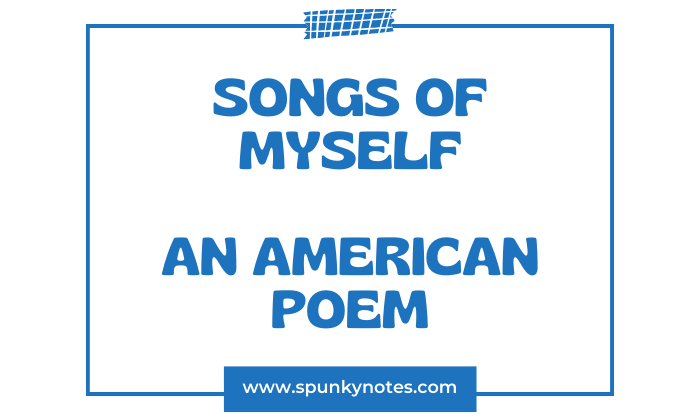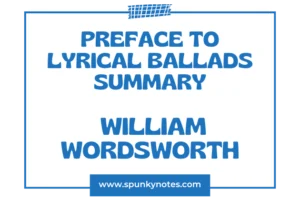
Q. Do you agree that Song of Myself is the most representative American poem? What would make it representative and democratic?
Introduction
Walt Whitman’s “Song of Myself” is regarded as one of the most significant American poems. Whitman uses a unique free verse style that breaks from traditional European poetic forms and aligns more closely with American values of openness and inclusion.
The poem presents a panorama of American life, incorporating voices from various social backgrounds, thus showcasing the American experience.
Representation of American Values
Walt Whitman’s “Song of Myself” celebrates essential American values such as freedom, individuality, and unity. Whitman praises individual rights to self-expression, which is a fundamental part of American identity.
Whitman also emphasizes equality, pointing out that each voice, regardless of social or economic status, is valuable.
He includes people from different segments of society, from workers to women, highlighting the importance of every individual in shaping the nation.
Furthermore, Whitman illustrates the diverse Americans as a unified group that combines various voices under one national identity. Through shared experiences in these common spaces, he fosters a sense of community and belonging among Americans.
I celebrate myself, and sing myself,
This line underscores Whitman’s declaration of personal freedom and individuality. It reflects the American ideal that everyone has the right to express themselves freely and celebrate their own identity.
For every atom belonging to me as good belongs to you.
Whitman emphasized the idea of equality, suggesting a fundamental sameness and shared experiences among all people. It promotes the democratic principle that all individuals share equal value regardless of status.
I bequeath myself to the dirt to grow from the grass I love,
If you want me again look for me under your boot-soles.
These lines highlight Whitman’s deep connection with the American landscape, symbolizing the unity of the individual with the nation. He suggests that even in death, he remains a part of the land and, by extension, a part of the people. This portrays a collective identity that binds Americans together.
Democratic Tone and Style
Walt Whitman’s “Song of Myself” is renowned for its democratic tone and style, which reflect the poet’s vision of America as a land of freedom and equality. Whitman employs free verse, which breaks away from traditional European structures.
This choice symbolizes a break from old constraints and celebrates the individual voice, embodying the democratic spirit of America, where every person’s voice matters.
The poem’s style is open and inclusive. It directly addresses the reader and invites them to join in the experience. Whitman writes as if he is speaking to each reader individually, yet he connects us all in a common human experience.
His conversational tone and everyday language make the poem accessible to a broad audience. It reinforces the democratic idea that poetry should be for everyone.
Using free verse and a conversational style, Whitman makes poetry more accessible and relatable to a broad audience, removing barriers that might make it feel exclusive. Democratic style can involve several aspects:
1- Form and Structure
Adopting forms like free verse, which does not adhere to traditional metrics or rhyme schemes, can make poetry feel more spontaneous and less rigid.
Whitman’s free verse is evident throughout “Song of Myself,” but the lack of consistent rhyme or meter is seen across the entire poem. An example can be inferred from how the poem flows in a natural, prose-like rhythm without formal constraints.
2- Language Use
He utilises everyday, straightforward language rather than complex or archaic vocabulary, which helps ensure that poetry is understandable to people from various educational backgrounds. This makes poetry more inclusive and relatable to readers.
Clear and sweet is my soul, and clear and sweet is all that is not my soul.
This line uses simple, everyday language to express profound philosophical ideas, making the concept of the soul relatable and understandable.
3- Themes and Content
Addressing universal themes such as life, love, struggle, and joy or focusing on social justice and equality issues. This approach can make poetry a tool for reflection and conversation across diverse communities.
I am of old and young, of the foolish as much as the wise,
Regardless of others, ever regardful of others,
Whitman is inclusive, addressing people of all ages and walks of life. Thus, he discusses the theme of human commonality across different demographics.
4- Engagement with Readers
Writing in a style that converses with the reader, as Walt Whitman does, invites individuals to see their experiences and emotions reflected in the poem. This interactive style breaks down the traditional barriers between the poet and the audience.
For every atom belonging to me as good belongs to you.
This line directly addresses the reader, creating a sense of unity. It exemplifies how Whitman’s style bridges the gap between poet and reader. He makes the poem feel like a conversation rather than a monologue.


